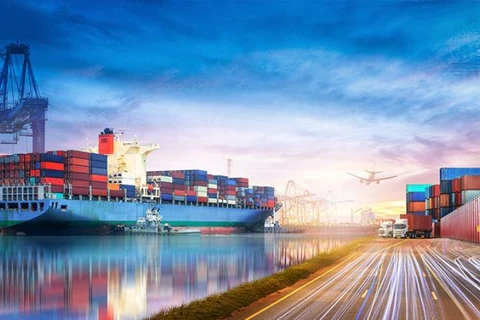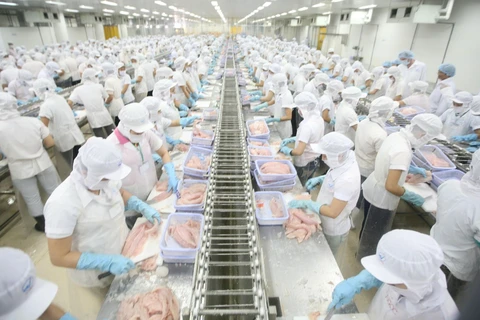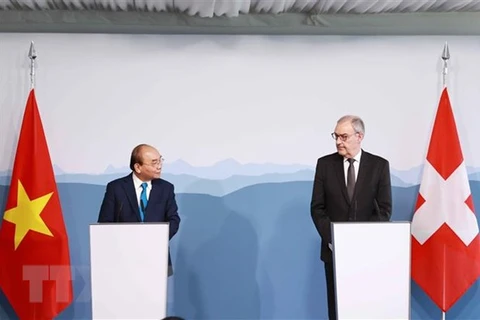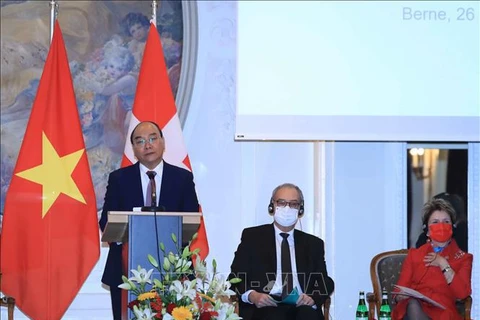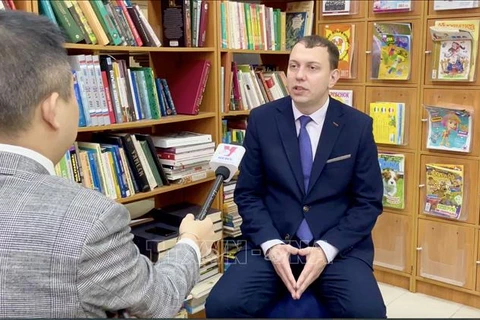 A conference to review the performance of the industry and trade sector in 2021, and discuss its orientations and tasks for 2022, in Hanoi on January 9. (Photo: VietnamPlus)
A conference to review the performance of the industry and trade sector in 2021, and discuss its orientations and tasks for 2022, in Hanoi on January 9. (Photo: VietnamPlus) Hanoi (VNA) – Deputy Prime Minister Le Van Thanh has asked the Ministry of Industry and Trade (MoIT) to take effective measures to fully tap the advantages brought about by free trade agreements (FTAs) that Vietnam has signed with its international partners.
Attention must be paid to promoting exports; expanding export markets and diversifying export goods; effectively solving obstacles facing customs clearance activities to prevent congestion at seaports and border gates, especially at Vietnam-China border gates.
The MoIT will be responsible for coordinating with other ministries, sectors and localities to design comprehensive solutions and promote official exports to China.
Deputy PM Thanh made the requests at a conference to review the performance of the industry and trade sector in 2021, and discuss its orientations and tasks in 2022 in Hanoi on January 9.
Looking into bottlenecks
According to the MoIT, Vietnam's imports and exports witnessed spectacular growth, becoming a bright spot in the national economy during 2021 despite the complicated developments of the COVID-19 pandemic.
Vietnam’s import-export turnover in 2021 hit a record of 668.5 billion USD, up 22.6 percent year-on-year, of which exports reached 336.25 billion USD, up 19 percent.
Imports earned 332.25 billion USD, up 26.5 percent, helping Vietnam be named in a group of 20 leading economies in terms of international trade.
The structure of export goods continued to record positive changes too, reducing the number of raw exports and increasing exports of processed and industrial products, highlighting how Vietnam's goods have integrated further into the global production and supply chains.
The group of processed industrial products continued to account for a major proportion, about 86.24 percent of the total export turnover, up 0.6 percentage points compared to 2020.
However, Deputy Minister of Industry and Trade Tran Quoc Khanh pointed out existing shortcomings and limitations, saying that Vietnam’s export has been increasingly dependent on FDI in recent years.
Statistics showed that export turnover of the foreign-invested sector (including crude oil) reached an estimated 247.5 billion USD in 2021, up 21 percent, accounting for 73.6 percent of the total export turnover.
Meanwhile, the export turnover of the domestic economic area was estimated at 88.7 billion USD, up 13.4 percent.
The competitive advantage of Vietnam's exports is still mainly based on price, not on quality, Khanh said, noting that unsustainable export development will affect the overall export turnover due to fluctuations in the commodity market.
Additionally, the market expansion of products such as vegetables and fruits still remains slow, while the quality of some products has not yet met the standards and requirements of many markets, he added.
The prolonged congestion of agricultural products at border gates has also affected cross-border trade activities, he said.
Promoting exports
Speaking at the event, Minister of Agriculture and Rural Development Le Minh Hoan suggested that his ministry and the MoIT jointly propose the Government focus on building farm produce export projects to potential markets.
Citing lessons learnt on market in the European Union (EU) shared by European ambassadors recently, Hoan said the export to the EU market should be professionalised and concentrate on promoting trade activities and researching market culture.
For other markets, he also suggested that ministries, sectors and businesses should continue to diversify products, and implement plans to support the protection of trademarks and geographical indication for potential export products.
For his part, Deputy Foreign Minister Nguyen Minh Vu urged ministries and sectors to closely coordinate in implementing commitments in FTAs, and in supporting Vietnamese businesses in promoting goods and improving the competitiveness of their products.
According to Minister of Industry and Trade Nguyen Hong Dien, e-commerce is a popular and growing trend that will become a new driver of growth, contributing to preventing disruptions of goods supply chains and promoting exports.
To create momentum for exports, the MoIT will continue to effectively implement the FTAs that have come into effect; speed up the diversification of export markets and products, restructure the market; and pay heed to improve the quality of goods, he affirmed./.

